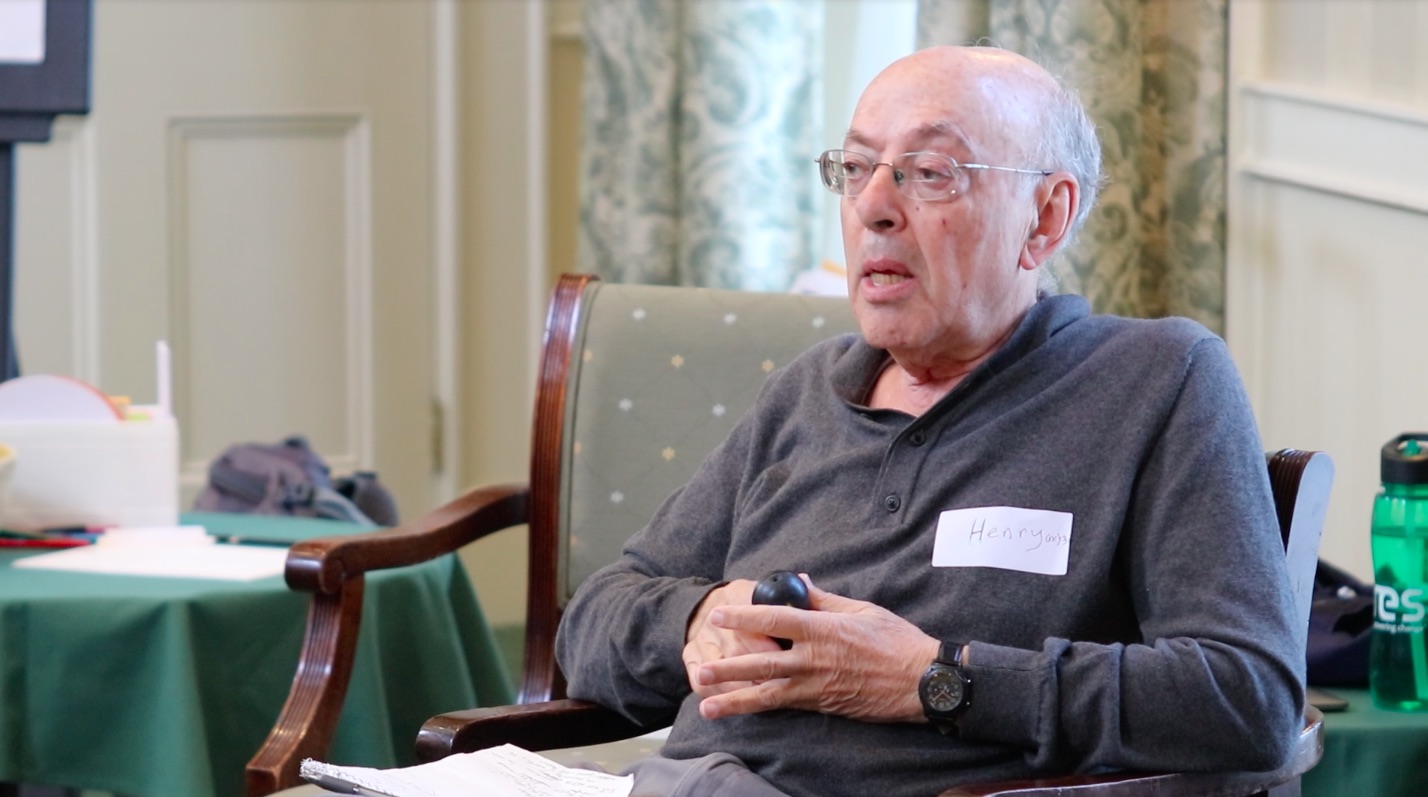Reflections on the two-day retreat, and where next
October 2019
Facilitated by Dr Alexandra Stubbings and Prof Jonathan Gosling
In late September 2019 a highly diverse group of 20 participants came together at Hartwell House in the Buckinghamshire countryside. Convened by Talik and Pelumbra, the group included leaders, change agents and activists from business and banking, central and local UK government, international NGOs and civil society organisations. The youngest participant was 19, the eldest 80. The common interest amongst us all was concern about the unfolding climate and environmental catastrophe and what we each can and should be doing to radically change ourselves and society.
In what proved to be the last warm days of a record-breaking hot summer, we spent our time inquiring, learning and reflecting together, with powerful inputs from the strategist Henry Mintzberg on the critical role of the ‘plural’ (civil society) sector and from Jonathan Gosling with insights from Deep Adaptation.
This summary collates salient insights on the experience and process from conversations with participants, and early ideas on next steps – which will unfold further in the weeks and months ahead.
An ever more urgent issue
When Alexandra and Jonathan began to conceive of this event, Extinction Rebellion (XR) had yet to announce their declaration of rebellion; Greta Thunberg was beginning to draw attention, sitting alone outside the Swedish Parliament; the UK Government had yet to declare a climate emergency. Our intention was to convene a group of people from across sectors to explore what is needed to act upon climate change in a more joined up and proportionate way. Fast-forward a year and a number of unprecedented extreme weather events later, and the urgent need to accelerate such action has become daily front-page news. Suddenly we were convening this retreat in the midst of a record-breaking global climate strike.
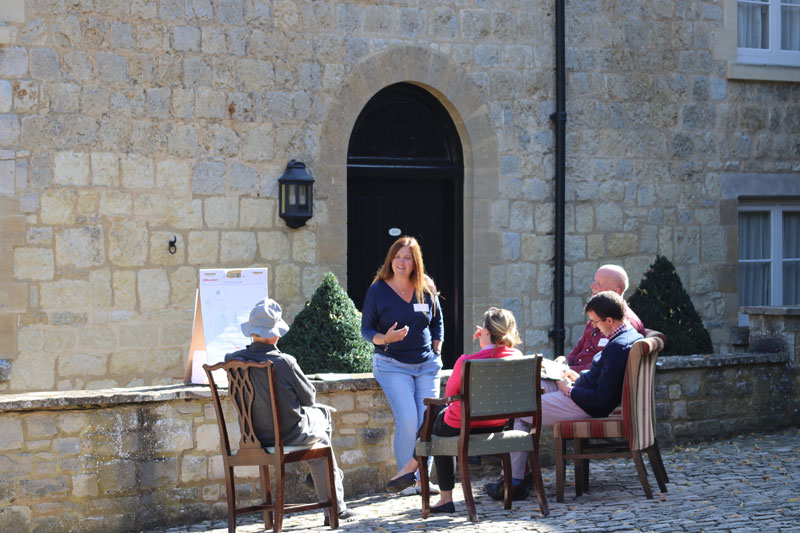 This was the context in which our group met. And like the millions striking around the world, we faced into the unfolding environmental catastrophe and asked ourselves similar urgent questions – How do we compel radical change fast? What can we each do? How do we face into the scale of the challenge? How do we contend with the high likelihood of failure? And vitally how do we take care of ourselves and each other through the coming years and decades?
This was the context in which our group met. And like the millions striking around the world, we faced into the unfolding environmental catastrophe and asked ourselves similar urgent questions – How do we compel radical change fast? What can we each do? How do we face into the scale of the challenge? How do we contend with the high likelihood of failure? And vitally how do we take care of ourselves and each other through the coming years and decades?
Over the two days the group explored these questions in many ways, tapping into different forms of knowing and expressing, sitting with not knowing, confusion and the urge towards action in response to the emergency. Each brought a systemic challenge of our own, from the deeply local and personal, to large-scale, cross-sectoral systems change, and we contemplated these challenges afresh in the context of XR’s five-year time horizon to reach net zero.
Collective reflections
A number of common threads emerge from the feedback, including on the design, process and conditions of the retreat itself. They enabled people to ‘get deeper quicker’, develop strong bonds and express their emotions safely and more openly than is typical. Given the intensity of emotion that contemplating collapse evokes, it is valuable to know how to create the best conditions to have such conversations again and to share not only with those who attended but with others too. So what are they?
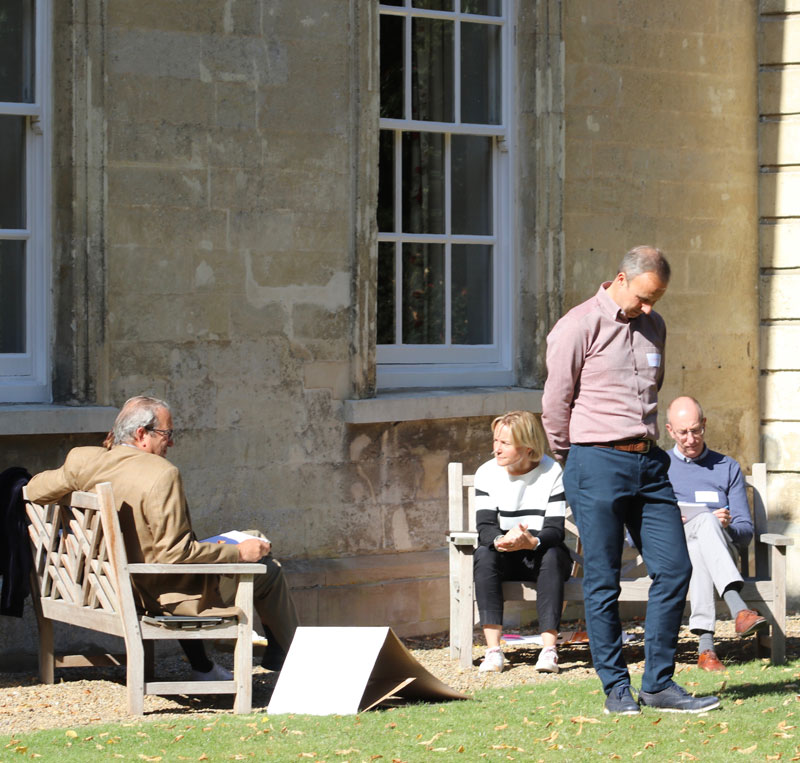 The place
The place
We met in an extraordinary location. A large historic house in the English countryside is far from representative of the future low carbon world we need, and is open to criticism for being exclusive, but being in beautiful countryside and surrounded by history also served to focus us on matters of conservation, legacy and letting go and provided more expansive headspace to think and feel.
Diversity of participants
We had three generations in the room, with participants from varied backgrounds, sectors and experience. In particular we had representation from public, private and plural sectors, with central and local government, international business and community activists. Such diversity might be expected to raise levels of defensiveness and self-protection, but in this case, it seemed to reduce them, perhaps because of the ‘common cause’ of climate and associated values, but also because clearly no-one could be a ‘single point of truth’ on either problems or solutions.
Making it OK to be confused
Contracting well as a group – allowing for questions, not knowing and encouraging participants to stay with their confusion, however unpleasant that feels – is critical at the outset, and the role of the facilitator is to help hold this process and if necessary offer these principles to support the group process. (Indeed, the facilitator themselves needs to not be drawn by the group into ‘rescuing’ by providing answers or seeking to make the group more comfortable). “If we’re not feeling incompetent or impotent in the face of the challenge, we’ve not understood it!” was one comment, and another: “it felt comfortable to float partly-formed thoughts and ideas; I didn’t feel shamed”.
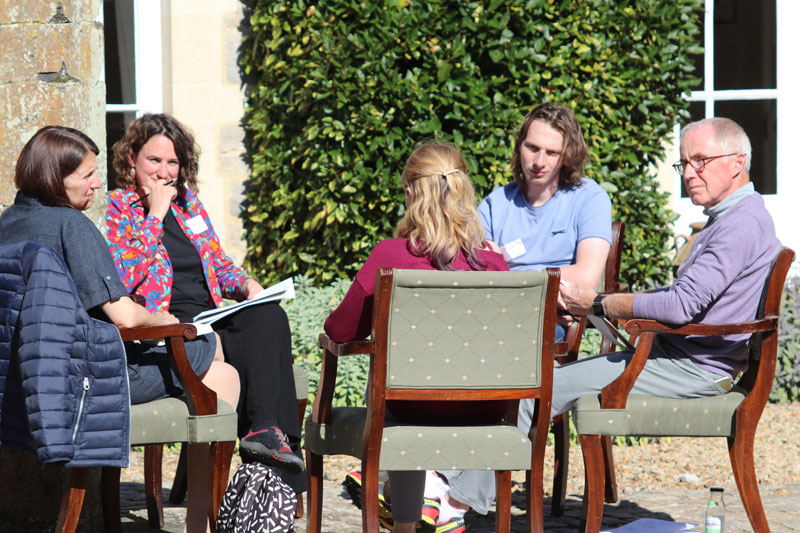 Deeply listening
Deeply listening
Using Jonathan’s exposition of Jem Bendell’s Deep Adaptation as a starting point, we explored what really matters to us, what brought us here. In small groups (threes), we listened deeply to each other’s stories, imaginings and fears, sharing back what had been articulated in ways that enabled people to feel really heard. We connected in a way that was described as “emotional and purpose-filled”, a way that is “too rare in a professional environment”. It allowed us to turn up as “people not roles”.
Building trust
It’s hard to pin down what creates trust but it’s a vital precursor to being candid, and at the same time the candour helps build trust. Knowing that someone is holding your feet to the fire – with love – to uphold your own expressed values, to be more ambitious and urgent in your actions, is very powerful. We’ve built some lifelong friendships here!
Other ways of ‘knowing’
In the second session, each of us drew our challenges, tapping into non-verbal and visual ways of knowing, enabling each of us to not only express the complexity of the challenge to others but uncover hitherto out-of-awareness aspects of the challenge for ourselves – bring new connections and meanings to light.
 Getting into nature
Getting into nature
The manicured parks of Hartwell House are a long way from baking savannah and retreating glaciers yet being outside in woodland as the leaves turn for autumn, sitting on grass and walking barefoot, watching herons fishing on the ponds, all connect us more deeply with our natural selves than we feel being indoors.
The imperfect system
Coming together overnight enabled the majority of the group to dwell more intensely in the questions and experiences of participation. Some would have liked longer, others felt it was about right. A number of participants in the end could only arrive in the evening of day one or just join for day two. On the one hand this was disruptive to the group dynamic formed on day one, but conversely it was a mirror of the very real experience we have of operating in a systemic way – people do arrive and leave at different times, nothing is perfect, we never truly get the ‘system in the room’. Far better to learn about how to operate with an imperfect system, to welcome newcomers generously, appreciating we all have competing priorities, than wish for a perfect one.
Coaching ourselves
In a context of radical disruption and not knowing, the capacity to learn from each other’s experience and most importantly our own, particularly at speed, becomes a critical skill. Providing a tight process to manage peer coaching (45 minute closely-timed sessions) helps hold an otherwise unwieldly exploration of a challenge on track. Facilitating an inquiry process followed by action orientation helped steer the ‘coachee’ into deeper understanding of their own framings and perspectives and thence into ideas for experimenting. Inviting the coachee to ‘get on the balcony’ (turn their back to the group) to really listen to group insights on their issue, helps reduce defensiveness and builds trust and empathy.
Stimulus and new questions
Henry Mintzberg brought additional insight and provocation, proposing that the common cause behind many global challenges – from climate change to out-of-control globalisation to the rise of populism – is imbalance between the public, private and plural sectors at the national and international levels. Rebalancing society starts with raising the voice of the plural sector to make a more stable three-leg stool, and that itself requires more ‘communityship’ than leadership.
Insights and takeaways
 Rebalancing and Reformation
Rebalancing and Reformation
This work is disturbing as well as disruptive – we are confronting our individual and collective participation in creating the problem, being part of the system. The idea of ‘rebalancing’ makes intuitive sense and yet feels overwhelming, and even then is not enough. The plural sector is like our social ‘conscience’ – it expresses to policy-makers and to business what matters to people right now, their highest values. Too often, in an imbalanced society, perched unsteadily on two legs of public government and private business, the plural sector has filled the gaps of the market failures that the imbalance has propagated. A reformed, more balanced society would see the voice and conscience of citizens informing policy and investment choices far more, and strengthening an economy of gifts and goodwill, not just financial exchange.
The few, not the many
XR’s approach to non-violent civil disobedience is, among other things, grounded in the social science finding that mobilizing 3.5% of the population is sufficient to effect systems change. We reflected too that it is less about moving ‘the many’, than getting the ‘nucleus of committed parties’ who together can drive change.
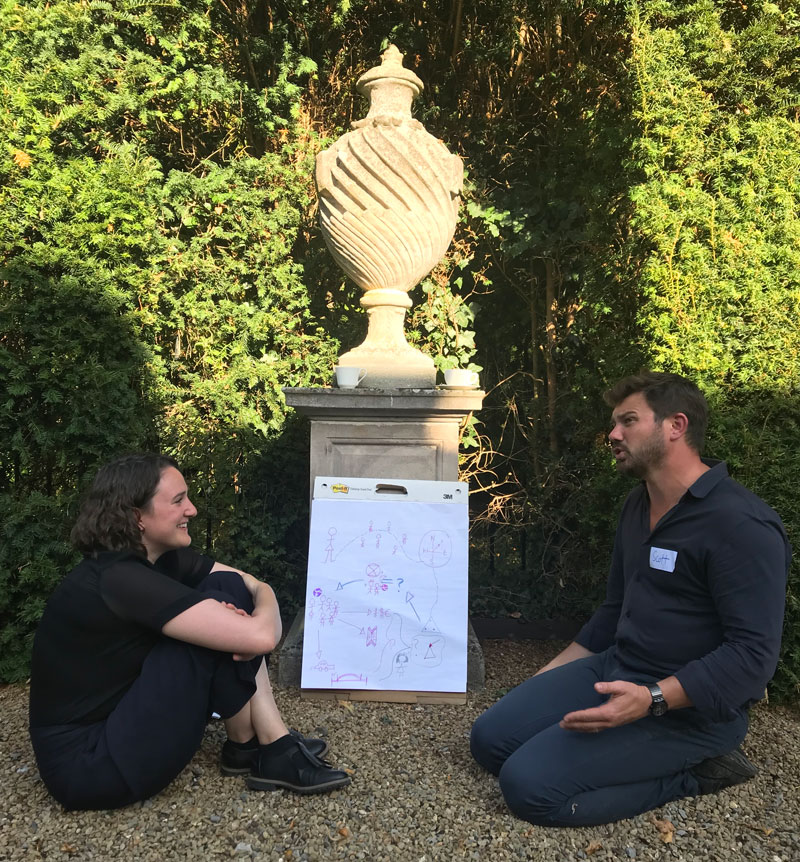 Revealing the system
Revealing the system
Taking a sector, such as Built Environment, and looking at its make-up systemically across sectors – from public policy to commissioning to land development to construction and so on – might reveal where ‘incisive interventions’ into the system could radically shift how it operates, ideally removing barriers to net zero development.
Get ‘the money’ in the room too – a fourth P?
However a problem is analysed, sooner or later it still comes down to investment – in particular the critical need to create fundable propositions and de-risk investments. Reforming what constitutes ‘fundable’ and ‘risk’ is a vital endeavour in itself, and another core part of the system that needs addressing.
Perhaps it even merits framing as a fourth leg for the stool, another P – Provisioning? Reframing finance as the lubricant of transformation reminds us of the original purpose of finance – to ‘provision’ other sectors to facilitate their activities.
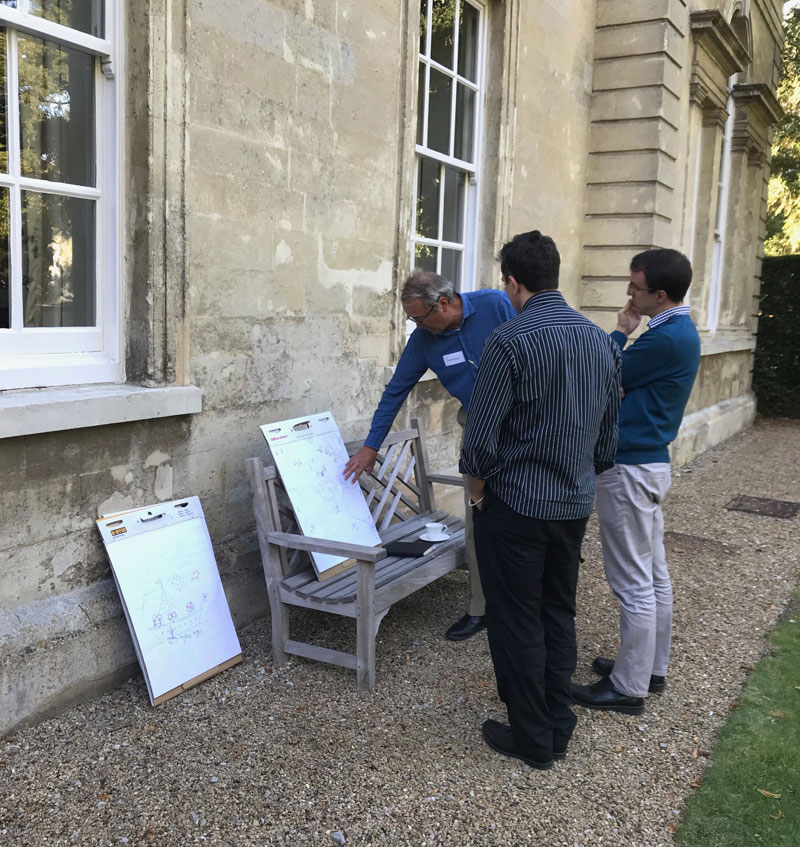 Reframing our roles
Reframing our roles
For most of us, our individual careers and jobs become radically transformed in the context of net zero, at least by today’s technological and social standards. Is there an ‘emergency response’ framing for what we each do? And is such a framing (with its connotations of immediate reaction and literal fire-fighting) helpful or could it create more problems than it solves? What is the critical care that is needed and how can helping professions develop the skills to provide it?
And how do we fundamentally reshape what matters to each of us in the face of collapse?
Getting hyper-local
In the context of net zero, even coming together, especially for an international group, is clearly problematic. How then do we sustain our connection and strengthen empathetic ties with others far away, whilst simultaneously re-localising ourselves in our lives and livelihoods.
Capturing for ourselves and each other our reflections and commitments on video helps keep the network alive. We can use technology more. All these questions remain live and the answers are inherently dynamic.
Actions and next steps
A number of opportunities to move to action emerged by the end of the retreat and these are being taken forward by groups of participants independently and collectively in a future workshop.
-
- 1. Mapping the built environment system
-
- 2. Producing a discussion paper – writing about our experience and the challenges of working across sectors for publication
-
- 3. Personal carbon accounting – understanding our personal impacts more deeply and how this may inform our behaviour
-
- 4. Getting ‘the system in the room’ around a very specific challenge – such as a Local Authority declaring a climate emergency and determining actions.
This reflection paper will be updated again as the co-inquiry continues.
For more information, contact Alexandra Stubbings at alexandra@talikandco.net.



